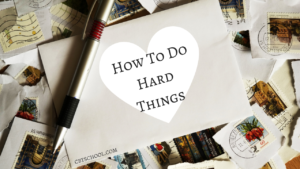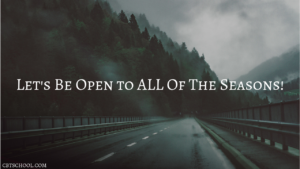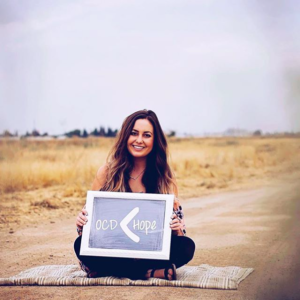Sep 27, 2018
How To Do HARD THINGS...It's A Beautiful Day For It!!
 Welcome back to another Your Anxiety Toolkit Podcast episode! This week’s episode of Your Anxiety Toolkit is all about How to do Hard Things. I know I say “Its a beautiful day to do hard things” all the time, and sometimes people message me or email and ask me, “How do I do hard things?” Even friends and loved ones might call to ask, “Can you teach me how to do hard things?” These hard things might be doing Exposure & Response Prevention (doing something that scares you), taking a test, going to a doctor visit, traveling long distances, feeling intense feelings such as sadness or grief, delivering a speech, experiencing pain or any other event that scares the pants off you. :) A little note on this before we move on; Doing a Hard Thing is doing the thing that scares YOU, even if it doesn’t scare others. If it is hard for you, it is hard. Try not to judge yourself or compare yourself to what is hard for you vs. others. After talking with a dear, loved one this week about an upcoming “hard thing” they were preparing to do, I decided to write them a letter. My hope was they could read it as they prepared to stare their hard thing in the face (take that hard thing!). After sending it, I wondered if maybe you needed a similar letter. So, here we go. Here is the letter I sent my friend. I hope you find it helpful in understanding how to do hard things. "Hi my love, Here are the most important things to remember when dealing with fear, dread, and panic. Just because your brain is telling you there is "danger,” doesn't make it true or real or correct. Our brain misfires (and make mistakes) ALL the time and it is our job to help direct it back to more reasonable reactions. If we react with resistance, we keep training it to misfire. Our job is to just allow the anxiety, without reacting to it. We gently allow it to be present and allow it to rise and fall on its own. With this practice, we not only re-train our brain, but we learn that beyond this moment of discomfort is freedom. Just a few minutes beyond this discomfort is our opportunity to do whatever the fuck we want with our lives. Fear doesn't get to make our decisions. Our values and hopes and dreams do. You are strong, but you don't have to be stronger than fear. It's not a fight, so don't fight it. Slow everything down and gently say to it, "its ok, fear. I am just going to allow you to be here while I do the thing I love to do. You don't get to control me. Love, Kimberley" Also, CBT School is also excited to share that our lovely friend Stuart Ralph is offering The OCD Summit, an online summit specifically for OCD therapists. The OCD Summit will be a 6-week webinar series where Stuart Ralph, host of The OCD Stories podcast, will interview some incredible scientists and clinicians in the OCD field, with you the therapist as the audience. Kimberley is honored to be selected to be one of the panelists for this exciting event. Registration will include 6 topics curated for your continued development as an OCD therapist, where you can ask questions and network with other therapists in the private FB group community. Click here to join. Lastly, OCD Awareness Week is coming up: October 7-13! OCD SoCal will celebration OCD Awareness Week on October 7 from 1:00 pm-5:00 pm in Los Angeles, Orange County, and San Diego. Go to IOCDF.org or search your local area for events.
Welcome back to another Your Anxiety Toolkit Podcast episode! This week’s episode of Your Anxiety Toolkit is all about How to do Hard Things. I know I say “Its a beautiful day to do hard things” all the time, and sometimes people message me or email and ask me, “How do I do hard things?” Even friends and loved ones might call to ask, “Can you teach me how to do hard things?” These hard things might be doing Exposure & Response Prevention (doing something that scares you), taking a test, going to a doctor visit, traveling long distances, feeling intense feelings such as sadness or grief, delivering a speech, experiencing pain or any other event that scares the pants off you. :) A little note on this before we move on; Doing a Hard Thing is doing the thing that scares YOU, even if it doesn’t scare others. If it is hard for you, it is hard. Try not to judge yourself or compare yourself to what is hard for you vs. others. After talking with a dear, loved one this week about an upcoming “hard thing” they were preparing to do, I decided to write them a letter. My hope was they could read it as they prepared to stare their hard thing in the face (take that hard thing!). After sending it, I wondered if maybe you needed a similar letter. So, here we go. Here is the letter I sent my friend. I hope you find it helpful in understanding how to do hard things. "Hi my love, Here are the most important things to remember when dealing with fear, dread, and panic. Just because your brain is telling you there is "danger,” doesn't make it true or real or correct. Our brain misfires (and make mistakes) ALL the time and it is our job to help direct it back to more reasonable reactions. If we react with resistance, we keep training it to misfire. Our job is to just allow the anxiety, without reacting to it. We gently allow it to be present and allow it to rise and fall on its own. With this practice, we not only re-train our brain, but we learn that beyond this moment of discomfort is freedom. Just a few minutes beyond this discomfort is our opportunity to do whatever the fuck we want with our lives. Fear doesn't get to make our decisions. Our values and hopes and dreams do. You are strong, but you don't have to be stronger than fear. It's not a fight, so don't fight it. Slow everything down and gently say to it, "its ok, fear. I am just going to allow you to be here while I do the thing I love to do. You don't get to control me. Love, Kimberley" Also, CBT School is also excited to share that our lovely friend Stuart Ralph is offering The OCD Summit, an online summit specifically for OCD therapists. The OCD Summit will be a 6-week webinar series where Stuart Ralph, host of The OCD Stories podcast, will interview some incredible scientists and clinicians in the OCD field, with you the therapist as the audience. Kimberley is honored to be selected to be one of the panelists for this exciting event. Registration will include 6 topics curated for your continued development as an OCD therapist, where you can ask questions and network with other therapists in the private FB group community. Click here to join. Lastly, OCD Awareness Week is coming up: October 7-13! OCD SoCal will celebration OCD Awareness Week on October 7 from 1:00 pm-5:00 pm in Los Angeles, Orange County, and San Diego. Go to IOCDF.org or search your local area for events.
Sep 20, 2018
Grieving the Losses of Mental Illness
 Psst! This wasn't planned, but we decided to keep ERP SCHOOL open for ONE MORE DAY! If you are still interested in purchasing the online course for Exposure & Response Prevention (ERP) SCHOOL, it is available until midnight tonight (9/21/18). It didn’t feel right to release a podcast the day after the cart was closing and risk you missing out by only one day. So, this is the last day, I promise (for 2018). I am so grateful to everyone who supported me and sent me information about their successes since signing up and taking the course. This week’s episode of Your Anxiety Toolkit Podcast is possibly one of my most favorites. The reason for this is that this episode will give you so much validation for the pain you are going through. In this week’s episode, we have Chrissie Hodges, a Peer Support Counselor for mental health. In this episode, Chrissie talks with us about the importance of Peer Support and how she offered her own experience of recovery as a way to help guide and lead those who are also managing Obsessive Compulsive Disorder, Depression, Anxiety and many other mental illnesses or struggles. Chrissie also addresses a topic I have been wanting to talk about for the longest time, which is life AFTER treatment. It is such a common question I get asked. How do we survive when life looks so different? How to get past how difficult that experience was? What can I do to grieve the losses of mental illness? The truth is, grieving the losses of mental illness is brave and courageous work. It requires us to honor our experiences and allow ourselves to feel some pretty hard and uncomfortable feelings. Grieving the losses of mental illness allows us to forgive ourselves for the hard times and the time lost. This episode of Your Anxiety Toolkit was quite a powerful one for me. Chrissie got real about her own process of grieving the losses of mental illness (specifically Obsessive Compulsive Disorder, Anxiety, and Depression). Chrissie also shares her experience with suicidal ideation and a suicide attempt that has traumatized her since. She also shares how difficult it has been on her body and how it has caused her to disown parts of her body and soul. If you are someone who is also grieving or feeling hopeless about all that you have lost in managing your mental illness, then this is the podcast episode for you. Links: Coffee with Chrissie Podcast Chrissie Hodges Website Chrissie Hodges Youtube
Psst! This wasn't planned, but we decided to keep ERP SCHOOL open for ONE MORE DAY! If you are still interested in purchasing the online course for Exposure & Response Prevention (ERP) SCHOOL, it is available until midnight tonight (9/21/18). It didn’t feel right to release a podcast the day after the cart was closing and risk you missing out by only one day. So, this is the last day, I promise (for 2018). I am so grateful to everyone who supported me and sent me information about their successes since signing up and taking the course. This week’s episode of Your Anxiety Toolkit Podcast is possibly one of my most favorites. The reason for this is that this episode will give you so much validation for the pain you are going through. In this week’s episode, we have Chrissie Hodges, a Peer Support Counselor for mental health. In this episode, Chrissie talks with us about the importance of Peer Support and how she offered her own experience of recovery as a way to help guide and lead those who are also managing Obsessive Compulsive Disorder, Depression, Anxiety and many other mental illnesses or struggles. Chrissie also addresses a topic I have been wanting to talk about for the longest time, which is life AFTER treatment. It is such a common question I get asked. How do we survive when life looks so different? How to get past how difficult that experience was? What can I do to grieve the losses of mental illness? The truth is, grieving the losses of mental illness is brave and courageous work. It requires us to honor our experiences and allow ourselves to feel some pretty hard and uncomfortable feelings. Grieving the losses of mental illness allows us to forgive ourselves for the hard times and the time lost. This episode of Your Anxiety Toolkit was quite a powerful one for me. Chrissie got real about her own process of grieving the losses of mental illness (specifically Obsessive Compulsive Disorder, Anxiety, and Depression). Chrissie also shares her experience with suicidal ideation and a suicide attempt that has traumatized her since. She also shares how difficult it has been on her body and how it has caused her to disown parts of her body and soul. If you are someone who is also grieving or feeling hopeless about all that you have lost in managing your mental illness, then this is the podcast episode for you. Links: Coffee with Chrissie Podcast Chrissie Hodges Website Chrissie Hodges Youtube
Sep 14, 2018
Seasonal Affective Disorder (SAD) is REAL and TREATABLE!
 This podcast episode of Your Anxiety Toolkit is all about the Seasons. I have received a lot of requests to talk about changing seasons as we move from Summer to Autumn (here in the Northern Hemisphere). It isn’t just here. I am sure it is all around the world right now, as the seasons change from Winter to Spring for the Southern Hemisphere (Love you Australia!). There is no doubt that the seasons impact out mental health. In this week’s podcast, I look at a few important things to consider when managing anxiety, depression, OCD and other mental health issues. First let’s look at how the change in temperature impacts us on a Medical level. Seasonal Affective Disorder, also known as SAD, is understood to be a seasonal depression, affecting 5% of the population of US residents. Yes! It’s that high. If you are someone who is highly impacted by the temperature changes, you are definitely not alone. Seasonal Affective Disorder (SAD) can be treated with light therapy, outdoor activity and medication. Seasonal Affective Disorder isn’t just due to changes in seasons. It often occurs when daylight saving times changes and we “fall back," meaning we have less light during the day. When days get shorter, we have less time to get outdoors and move our bodies and soak up that glorious sunlight, which is linked to Seasonal Affective Disorder symptoms. We also know that colder weather can affect our circadian rhythms, causing us to have more depressive symptoms. When we are tired, we have less energy, causing us to feel down or sad or, in some cases, depressed. We also know that the season changes impact us on a Psychological level. We can also see changes in our thoughts. Negative thoughts can create depressive symptoms such as hopelessness, helplessness and worthlessness. Our job is to correct any negative or faulty thoughts so we are not so impacted by the weather or time changes. We can also be more mindful when these thoughts arise. In this episode, we also can look at the seasons from a metaphorical stand point. We need to be careful how we approach the seasons, similar to how we approach our emotions. We could consider some emotions as winter (like sadness and shame and guilt) and some emotions as summer (like happiness and joy and arousal). We could consider autumn being patience and letting go and shedding what doesn’t serve us. We could also consider spring a time where we feel free and hopeful and alive. Metaphorically, if we treat one season (environmentally or emotionally) like it is less than or worse than, we will in turn start to have aversion to it. In this episode, we talk about how to be open to all of the seasons, whether you enjoy them or not. Lastly, Exposure & Response Prevention (ERP) School for Obsessive Compulsive Disorder (OCD) is HERE! Exposure and Response Prevention School is an online, video-based course that teaches you the tools and skills I teach my clients in my office. The doors are only open to purchase ERP School from September 6th, 2018 until September 20th, 2018. Six more days!! We are so excited to share ERP with you and would love to have you join us and the CBT School community. Its a beautiful day to do hard things!
This podcast episode of Your Anxiety Toolkit is all about the Seasons. I have received a lot of requests to talk about changing seasons as we move from Summer to Autumn (here in the Northern Hemisphere). It isn’t just here. I am sure it is all around the world right now, as the seasons change from Winter to Spring for the Southern Hemisphere (Love you Australia!). There is no doubt that the seasons impact out mental health. In this week’s podcast, I look at a few important things to consider when managing anxiety, depression, OCD and other mental health issues. First let’s look at how the change in temperature impacts us on a Medical level. Seasonal Affective Disorder, also known as SAD, is understood to be a seasonal depression, affecting 5% of the population of US residents. Yes! It’s that high. If you are someone who is highly impacted by the temperature changes, you are definitely not alone. Seasonal Affective Disorder (SAD) can be treated with light therapy, outdoor activity and medication. Seasonal Affective Disorder isn’t just due to changes in seasons. It often occurs when daylight saving times changes and we “fall back," meaning we have less light during the day. When days get shorter, we have less time to get outdoors and move our bodies and soak up that glorious sunlight, which is linked to Seasonal Affective Disorder symptoms. We also know that colder weather can affect our circadian rhythms, causing us to have more depressive symptoms. When we are tired, we have less energy, causing us to feel down or sad or, in some cases, depressed. We also know that the season changes impact us on a Psychological level. We can also see changes in our thoughts. Negative thoughts can create depressive symptoms such as hopelessness, helplessness and worthlessness. Our job is to correct any negative or faulty thoughts so we are not so impacted by the weather or time changes. We can also be more mindful when these thoughts arise. In this episode, we also can look at the seasons from a metaphorical stand point. We need to be careful how we approach the seasons, similar to how we approach our emotions. We could consider some emotions as winter (like sadness and shame and guilt) and some emotions as summer (like happiness and joy and arousal). We could consider autumn being patience and letting go and shedding what doesn’t serve us. We could also consider spring a time where we feel free and hopeful and alive. Metaphorically, if we treat one season (environmentally or emotionally) like it is less than or worse than, we will in turn start to have aversion to it. In this episode, we talk about how to be open to all of the seasons, whether you enjoy them or not. Lastly, Exposure & Response Prevention (ERP) School for Obsessive Compulsive Disorder (OCD) is HERE! Exposure and Response Prevention School is an online, video-based course that teaches you the tools and skills I teach my clients in my office. The doors are only open to purchase ERP School from September 6th, 2018 until September 20th, 2018. Six more days!! We are so excited to share ERP with you and would love to have you join us and the CBT School community. Its a beautiful day to do hard things!
Sep 6, 2018
ERP Is the Coolest Thing!
 If you have Obsessive Compulsive Disorder or any other mental health struggle, you are going to LOVE this episode of Your Anxiety Toolkit. This week we have Nathalie Maragoni, an Associate Marriage and Family Therapist who not only treats Obsessive Compulsive Disorder (OCD) and other anxiety disorders, but also knows exactly what it is like the experience the terror of intrusive thoughts, panic attacks and brutal compulsions. She said it best herself: “ERP is the coolest thing!” In this episode of Your Anxiety Toolkit, Nathalie talks with us about how she struggles finding the correct therapy for her Obsessive Compulsive Disorder (OCD) and how she drove for over 1.5 hours to get a treatment specialist who used Exposure & Response Prevention (ERP). Nathalie also talks about her struggle with different types of obsessions and compulsions. She says, “Willingness is the key to managing OCD” and she could not be more correct about this. We just loved how she shared her love for Exposure & Response Prevention and how “ERP is the coolest thing!” Nathalie shares the importance of continuing ERP after treatment. She found that getting the proper treatment alone (ERP) was not enough to help her live a full and thriving life with OCD. She discusses the importance of applying Acceptance and Commitment Therapy (ACT) and how this helps her live a value-based life where she can just allow thoughts to be there, instead of fusing with them. For more information about Acceptance & Commitment Therapy, click HERE. Nathalie talks about how she is using the book The Happiness Trap to help her understand that “Every experience comes with a good feeling and a bad feeling.” In other news, Exposure & Response Prevention (ERP) school is HERE. Exposure and Response Prevention School is an online course that teaches you the tools and skills I teach my clients in my office. Just like Nathalie says, ERP is the coolest thing! Let me tell you a little bit about it. The course is a video-based course that includes modules on:
If you have Obsessive Compulsive Disorder or any other mental health struggle, you are going to LOVE this episode of Your Anxiety Toolkit. This week we have Nathalie Maragoni, an Associate Marriage and Family Therapist who not only treats Obsessive Compulsive Disorder (OCD) and other anxiety disorders, but also knows exactly what it is like the experience the terror of intrusive thoughts, panic attacks and brutal compulsions. She said it best herself: “ERP is the coolest thing!” In this episode of Your Anxiety Toolkit, Nathalie talks with us about how she struggles finding the correct therapy for her Obsessive Compulsive Disorder (OCD) and how she drove for over 1.5 hours to get a treatment specialist who used Exposure & Response Prevention (ERP). Nathalie also talks about her struggle with different types of obsessions and compulsions. She says, “Willingness is the key to managing OCD” and she could not be more correct about this. We just loved how she shared her love for Exposure & Response Prevention and how “ERP is the coolest thing!” Nathalie shares the importance of continuing ERP after treatment. She found that getting the proper treatment alone (ERP) was not enough to help her live a full and thriving life with OCD. She discusses the importance of applying Acceptance and Commitment Therapy (ACT) and how this helps her live a value-based life where she can just allow thoughts to be there, instead of fusing with them. For more information about Acceptance & Commitment Therapy, click HERE. Nathalie talks about how she is using the book The Happiness Trap to help her understand that “Every experience comes with a good feeling and a bad feeling.” In other news, Exposure & Response Prevention (ERP) school is HERE. Exposure and Response Prevention School is an online course that teaches you the tools and skills I teach my clients in my office. Just like Nathalie says, ERP is the coolest thing! Let me tell you a little bit about it. The course is a video-based course that includes modules on: - The science behind ERP
- Identifying YOUR obsessions and your compulsions
- The different approaches and types of ERP, including gradual exposure, writing scripts, interoceptive exposures and how to get creative with ERP
- Mindfulness tools to help you manage anxiety, panic and uncertainty
- Troubleshooting common questions and concerns
- BONUS videos explaining the most common subtypes of OCD and how to apply ERP to these obsessions and compulsions.